





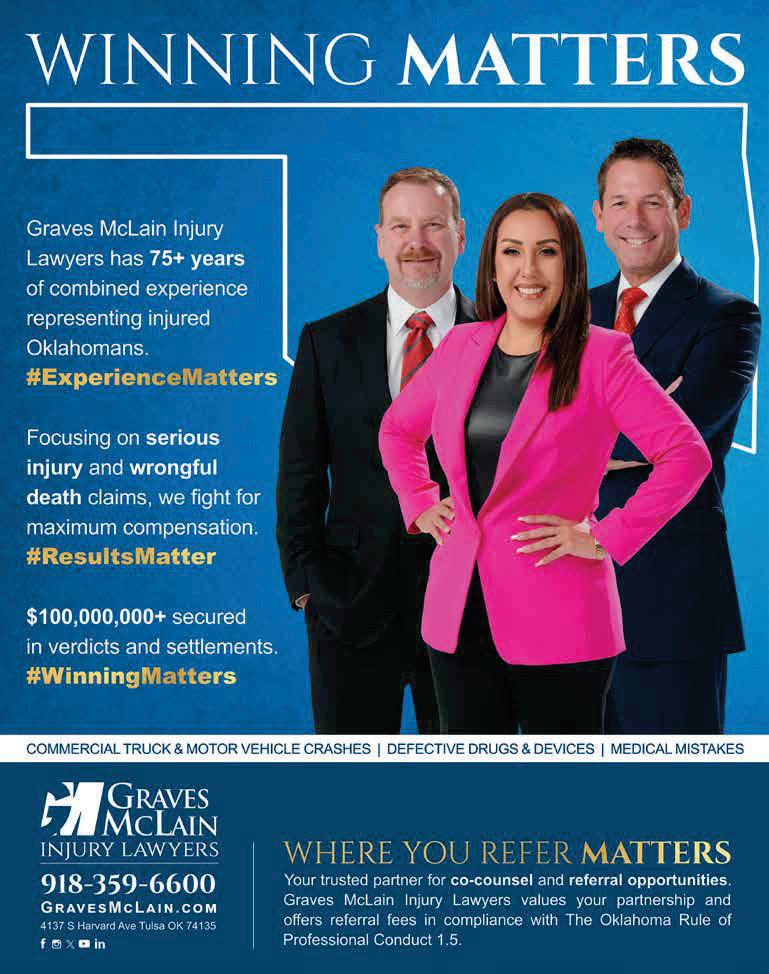








2Honoring Connection, Constitution, and Community Stephanie Jackson
3NEW!!! Native American Law Section



4Law Day Review 2025
5Fifty & Sixty Year Recognitions
Trivia Night - June 12th
Summer Pro Bono Challenge
6Tulsa County Law Library News
Member Event - Happy Hour - June 2nd
7Sandra Day O’Connor Award - Knox Brown
Volunteer Opportunity at the Day Center
8Brunton-Will CLE Award - Mbilike Mwafulirwa
9Liberty Bell Award - Ginnie Graham
10Golden Rule 3rd Quarter - Alan Barker
12Still Time to Join Us for Book Club
Eat Out for a Cause - June 11th
13TCBA & TCBF Annual Meeting & Luncheon
14Voices of the Tulsa County Bar AssociationMatt Farris
16Voices of the Tulsa County Bar AssociationBob Farris
Delegates Announced 20What Non-Immigration Lawyers Need to Know About Immigration Law Today: Q & A Interview with Attorney Lorena Rivas
Tamara T. Piety
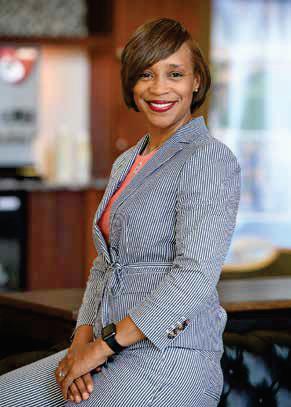
As we welcome the month of June, we are reminded of the many meaningful celebrations this time of year brings—most notably, Father’s Day. It’s a moment to honor the guiding
in our families and in our profession. To all the dads and mentors who lead by example, offer wisdom, and support others while balancing the demands of work and life, I salute you and thank you for all you do.
June also marks the conclusion of our annual Law Day celebration, and I want to express my heartfelt gratitude to everyone who made it such a tremendous success. Special thanks go to our resolute TCBA Ask-A-Lawyer Co-Chairs, Mary Clement and Lizzie Ritter, along with TCBF Law Day Committee Chair, Tana Van Cleave for their extraordinary leadership and dedication. Your hard work brought to life a
of our Constitution and our shared responsibility as members of the legal community.
This year’s Law Day theme, “The Constitution’s Promise: Out of Many, One,” reminds us of the enduring power of unity. We were honored to have Tulsa Mayor Monroe Nichols deliver an inspiring keynote address at our soldout Law Day Luncheon. His remarks beautifully captured the spirit of this year’s theme—highlighting not only what unites us as Americans but also what binds us together as a city, as Oklahomans, and as people committed to justice and service. His message also resonated deeply with our Street Law students, who joined us and left inspired about their own futures in law and civic engagement.
To all of our Law Day award recipients—congratulations! Your service, integrity, and commitment are shining examples of what our profession stands for. This year, we are proud to recognize Mbilike Mwafulirwa who has served the last three years at TCBA’s Litigation Section Co-Chair, and is this year’s recipient of the Brunton-Will CLE Award; Ginnie Graham of the Tulsa World, recipient of the Liberty Bell Award; and Knox Brown, Assistant Professor of Political Science at Tulsa Community College, who received the Sandra Day O’Connor Award. We are proud to celebrate your achievements and the lasting impact of your work in the legal and civic community.
As we look ahead to summer, I encourage each of you to take part in our upcoming events and Member Appreciation activities. Whether you’re new to the bar or have been a member for years, our goal is to offer something for everyone. Check our event calendar on the Tulsa County Bar Association’s website for details. These opportunities provide the perfect mix of fun, relaxation, and networking— great ways to connect with colleagues outside the courtroom
Please also take a moment to renew your membership if you haven’t already, and consider joining a committee. (renewals continued strength and impact of our bar association. Our
legacy is built on the involvement and passion of our members, and we are stronger when we each bring our talents to the table.
Finally, a sincere thank you to our board, TCBA staff, and volunteers who keep our bar association running smoothly. Your efforts, often behind the scenes, are noticed and deeply appreciated.
continued service.
Sincerely,
Stephanie Jackson TCBA, President, 2024-2025

The TCBA is thrilled to announce an exciting expansion of our offerings for the upcoming membership year! In our ongoing commitment to providing comprehensive resources and fostering a deeper understanding of the diverse legal landscape, we will be introducing a dedicated Native American Law Section.
This new section will serve as a vital forum for members who practice, study, or have an interest in the unique legal issues affecting Native American
of tribal sovereignty, self-determination, and the complex interplay between federal, state, and tribal law. This dedicated section will provide a platform for:
• Focused discussions: Engage in meaningful conversations about current legal developments, landmark cases, and emerging challenges in Native American law.
• Networking opportunities: Connect with colleagues who share your passion and expertise in this specialized area of law. Build relationships and collaborate on important issues.
• Educational resources: Access tailored content, including webinars, articles, and potential CLE programs, designed to enhance your knowledge and understanding of Native American law.
• Expert insights: Learn from practitioners, American law.
More details about how to join the Native American Law Section and upcoming activities will be shared as we approach the new membership year.
At this year’s Law Day luncheon, Tulsa’s mayor, Monroe Nichols, shared a heartfelt message about the importance of unity, shared values, and civic responsibility. The theme, “The Constitution’s Promise: Out of Many, One,” served as a reminder that our strength as a community comes from working together.
He noted that our nation’s future depends on the active role of its citizens. Quoting Judge Learned Hand, he emphasized that true liberty lies in the hearts of people—that laws and courts are only helpful if individuals uphold the spirit of freedom and understanding.
engaged and fostering connections in our communities. He highlighted that the true foundation of our country is built on mutual respect, dialogue, and shared purpose. While laws set the framework, it is our collective effort that keeps our democracy strong.

He also pointed out that history teaches us the value of vigilance and responsibility. The safest way to protect our principles is through ongoing effort—by working together, bridging differences, and supporting one another.
his commitment to community goals, including ending homelessness, increasing affordable housing, and making Tulsa a safer and more inclusive city. He emphasized that these aims depend on unity, collaboration, and shared dedication to building a better future.
encourages us all to participate actively in our community. Democracy and freedom require ongoing effort and a collective commitment — an ongoing reminder that “Out of Many, One” is more than a phrase; it’s a call to action for all of us.


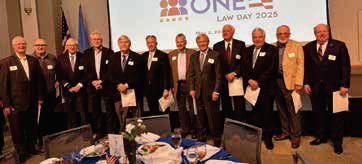
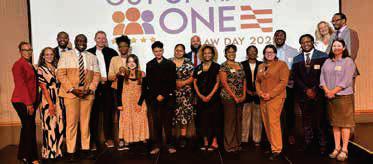




Phil Frazier
James O. Goodwin
Judge Stephanie Seymour
E. Clifton Baker, Jr.
Vaden F. Bales
Kenneth L. Brune
Mark E. Buchner
H. Wayne Cooper
Jack D. Crews
Robert A.Curry
Terrel B. DoRemus
James H. Ferris
Steven P. Flowers
H. Delbert Frieze
Richard A. Gann
James R. Gotwals
J. Kevin Hayes
James C. Hodges
Richard K. Holmes
Gary McDonald
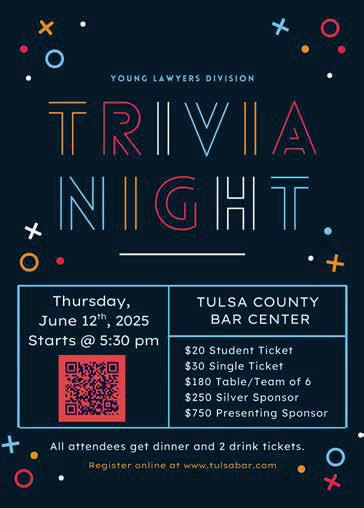

David B. McKinney
J. Michael Medina
John G. Moyer, Jr.
Charles “Buddy” Neal, Jr.
Richard B.Noulles
Harlan Pinkerton, Jr.
Thomas L. Restor
Carol J. Russo
Allen M. Smallwood
Charles M. Sublett
Timothy J. Sullivan
James A. Williamson

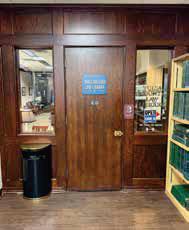
The Tulsa County Law Library is a hidden gem in the county courthouse that is equipped to assist attorneys with more than just books. Located on the courthouse it is just steps away from the Court Clerk’s civil desk. Here, we have the ability to make photocopies, deliver and pick-up signed orders, and the library has two terminals dedicated to Westlaw Next access.
Normally, a Westlaw Next subscription would cost the average attorney thousands of dollars each month. However, the Tulsa County Law Library provides free access to its
This subscription provides unlimited in-person access to various legal resources, such as case law from across the nation, federal opinions, and various examples of Oklahoma and Federal forms.

The Law Library is also a great place to meet clients or opposing counsel. Our facility has a small conference room, which comfortably seats up to three people, and a large conference room, which comfortably seats up to ten people. Both of these conference rooms may be reserved in advance by contacting the Tulsa County Law Library via email at lawlibrary@tulsacounty.org.
Another service the Law Library offers via email is our courier service. The Tulsa County Law Library E-Filing service is a courier service where attorneys are able to submit documents,
Claims Court Clerk desks. Moreover, attorneys may also submit a request to the Law Library to have a document picked up or delivered to a judge’s inbox or outbox. The corresponding charges for these services are outlined in the Tulsa County Law Library’s E-File invoice, which may be obtained by contacting the Law Library via email.
Whether, you are looking to print off a copy of the order you forgot at home, or you just want a quiet place to review your you covered!

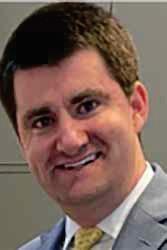
The Sandra Day O’Connor award honors the Supreme Court. In retirement, she made it her mission to highlight the importance of legal civics education. The award will go to those who the teaching of legal civics in Oklahoma schools.
This year, we are pleased to present this award to Knox Brown, an assistant professor of political science at Tulsa Community College. He studies and teaches American politics and received his B.A. in political science and his Ph.D. in political science
“Every year, I take a group of students to the state
Burma and China, two countries without a recent history of participatory democracy. Giving these and other students a front-row seat to the legislative process opens up a new world, one in which they can see the process live and in action,” shared Knox in a 2023 article he wrote for the James G. Martin Center for Academic Renewal. “In my class, the many people tune out of politics? This allows me to address not only some students’ hesitation to be in a required class, but their general disdain for, or indifference to, our political system.
On the website “Rate My Professors”, 89% of raters say they would take his courses again. Out of 104 raters, 83 rated him as “Awesome,” the highest score he could get.
“Every semester, the most common form of feedback I get from students is, to quote one recent conversation,
Congratulations, Knox, and thank you for educating young Oklahomans about their civic responsibility and encouraging their participation in government.
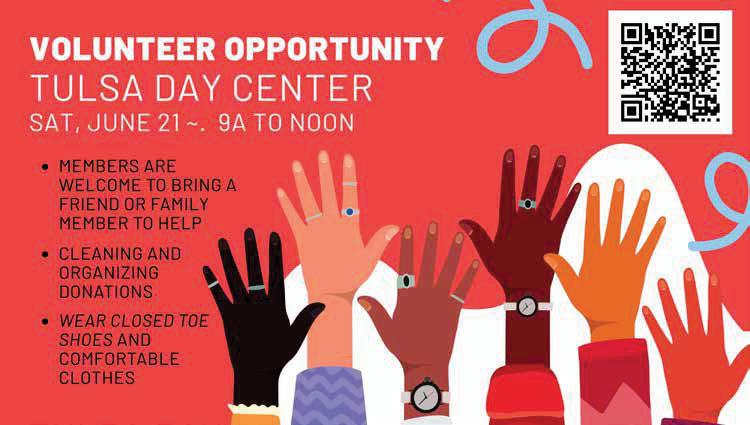
Mbilike Mwafulirwa
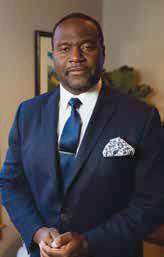
The BruntonWill CLE Award is presented annually to an outstanding Tulsa County attorney who has demonstrated excellence in consistently teaching CLE courses. This award recognizes an individual dedicated to educating and instructing attorneys in the ever-evolving legal landscape. This year’s recipient is Mbilike Mwafulirwa.
Mbilike is an attorney at Coffey Senger Hancock & Harmon and was most recently at Brewster & DeAngelis. He has served as the Litigation Section CoChair for three years and has successfully put together many CLES, garnering public interest and interest in all groups within the TCBA.
From the moment Mbilike became chair, he made it clear he wanted the Litigation Section to be a memorable and forerunning Section of the TCBA. He wanted this group to be notable in the kinds of information and
speakers it hosted. He always strived for well-attended and well-appreciated gatherings.
Notable CLE courses he has organized include “court views” from Judges like Chief Judge John Heil, Judge Moody, Judge Jason Robertson, and, maybe most notably, a discussion with all available federal Magistrate judges in the Northern and Eastern Districts of Oklahoma for a panel discussion about civil litigation in our federal courts. His goal was to leave an outstanding legacy of Section leadership while providing valuable education and insights, and he has!
He has always been fascinated with automation and the intersection of law and technology. This fascination led intelligence and how AI-powered tools like Alexa, Siri, and self-driving cars factor into the legal landscape. As ChatGPT and other generative AI tools grow in popularity, he incorporates those tools into his lectures and publications.
Thank you, Mbilike, for sharing your knowledge and including the TCBA in your quest for the most up-todate information on topics relevant to the practice of law.



The Liberty Bell Award is given to a nonlawyer who has promoted a better understanding of the rule of law, encouraged great respect for law and the courts, stimulated a sense of civic responsibility, or contributed to good government in the community. It is also one of the most prestigious awards presented by TCBF, and the Law Day Committee is proud to add Ginnie Graham as this years recipient.
has worked at the Tulsa World Newspaper for over 30 years and is currently the Editorial Pages editor. She has spent her career sharing fellow Oklahomans’ stories, the ups and downs, highs and lows, to stimulate a sense of civic pride and obligation in all of us.
Ginnie has investigated the tragedies of child abuse and neglect, inaccessibility of health care, substandard housing, and inequities among our residents. She says she covers these issues not because she’s a downer, but because
Ginnie says of opinion pages, “We need spaces for people to air their viewpoints and experiences in thoughtful and respectful ways. We cannot move forward if we dismiss or ignore each other. That’s why these growing divides are the most pressing issues we face. That’s where the Opinion pages have worth as a meeting place.”
Ms. Graham has a bachelor’s degree in journalism and a masters degree in public administration from the she has served on boards whose missions are important to
Student Publications Board, and Edison Preparatory School Foundation.


We are pleased to announce that Alan N. Barker has been awarded the 3rd Quarter Gold Rule Award by the Tulsa County Bar Association.
Allen’s dedication to integrity, community serspirit of the Gold Rule. Throughout his career, Alan has demonstrated a deep commitment to helping others through his legal practice and volunteer efforts.
He regularly volunteers with the Community eviction docket to assist residents facing eviction, and chairs the Lawyer Referral Services committee, fostering connections within the legal community.
His approach is always client-focused and strategic, ensuring that every individual he serves receives personalized and practical solutions.
Hailing from Payne County, Oklahoma, and deeply connected to the local community, Alan embod-

ies the core values of respect, empathy, and professionalism that the Gold Rule Award celebrates. With a distinguished academic record—graduating with Highest Honors from the
craft is evident in his over a decade and a half of legal service across Oklahoma, Missouri, and Mississippi.
For his integrity, community-mindedness, and exemplary service, we proudly award Alan Barker for the Gold Rule Award.
The Golden Rule award is given to lawyers who make outstanding contributions to their professions, have the highest of ideals, and are willing to mentor to those with less experience.
Criteria for Award:
1. Recognizes the ethical and professional obligations as an of Professional Conduct.
2. Practices ethically and honestly and is true to his/her word.
3. Strives for the traditional goals of moral excellence.
4. Exhibits the highest standards of fairness and integrity.
5. Sets a model example for conduct with members of the Bar and the Judiciary, not only by words but more importantly deeds.
6. Is civil, courteous and respectful towards the court and his/her opponents.
7 Is loyal to his/her client without trickery and deception and without using abusivepractices or misleading the court or opposing counsel.
personal vendetta.
9 Conducts himself/herself in a manner that improves the image of the legal profession in the eyes of the public.

Although Book Club usually does not meet in August, a bonus book will be discussed at a surprise destination. The book is Secrets of the Sprakkar: Iceland’s Extraordinary Women and How They Are Changing the World. What is it I think about those Icelandic women?
2025 Law Day Book Club will conclude in November with participant’s choice of reading one of H.W. Brands’ American history books. Brands is the 2024 Peggy V. Helmerich Distinguished Author Award recipient who is scheduled to be in Tulsa for a book signing on December 5. His Pulitzer Prize Finalist is about Benjamin Franklin’s life and times. Learning why Franklin Delano Roosevelt was a traitor to his class would be fascinating reading as well.
Contact heatherh@tulsabar.com or visit www.tulsabar.com
Note: Book Club generally meets at 5:30 p.m. on the fourth Tuesdays at the Bar Center, except August and December.
• June 24 - A Fate Inked in Blood, Danielle L. Jensen
• July 22 - Calling for a Blanket Dance, Oscar Hokeah
• August - No meeting (Bonus meeting for anyone interested, to discuss Secrets of the Sprakkar: Iceland’s Extraordinary Women and How They Are Changing the World
• September 23 - Anxious People, Fredrik Backman
• October 28 - When Will There Be Good News, Kate Atkinson
• November 25 - Book by H.W. Brands, American historian
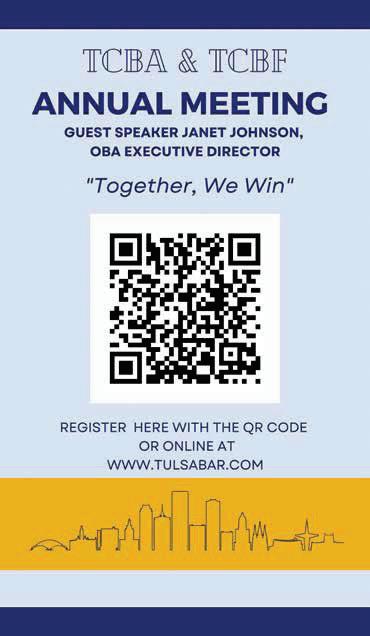



By Ralph Schaefer
Discipline is required in sports and law.
Matt Farris knows.
He played professional soccer after graduating from college, then earned a law degree, requiring both his full attention and discipline.
Matt played professional soccer for teams in Raleigh, North Carolina, and Charleston, South Carolina. He graduated
Moving back to Tulsa in 2002, Matt earned his law degree
The 1995 Tulsa Edison High School graduate, now Commerce Trust senior vice president/market executive, practice, and as a bank executive is comparable. One must
Discipline also helps attorneys, especially young attorneys, establish a work balance between professional, private life, and community involvement.
An important part of one’s legal career is getting involved with legal programs and activities offered by the Tulsa lawyers outside their practices.
to grow a practice and expand as an attorney,” he said. “Tulsa’s legal community is not very big, and you will get to know many people quickly. I would advise young attorneys to get involved.”
“I also am proud of the rare father-son combo as my father and I both served as TCBA presidents.”
Matt served in 2016-2017.
Recalling his love of sports, Matt’s soccer career started was the coach, and those early lessons and love of the game stuck.
Matt rarely plays his beloved game these days.
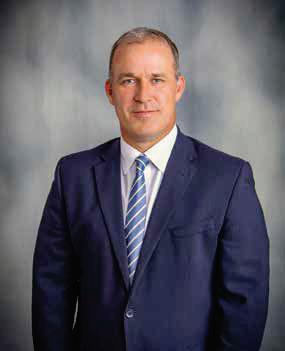
“I’m still involved and know all the soccer people in Tulsa,” he said. “I do play golf, tennis, and pickleball. I like and enjoy athletics and have done it my whole life.”
Playing Division One soccer in college required personal discipline.
where he attended on a soccer scholarship. That wasn’t a problem because he found he had a built-in community among other soccer players.
“I loved every bit of it,” he said. It was a lot of work playing Division One soccer in college because you were in training, lifting weights, and practicing for games while attending classes.
Matt said professional soccer differed greatly from college soccer because people’s livelihoods were on the line. A young player on a professional team doesn’t understand that until they experience the environment. It is serious business if an older player in his 30s, with a mortgage and two kids, doesn’t get either playing time or misses out on bonuses; his family suffers as a result. Consequently, it is much less about the collegiality of being part of a team and more about business and livelihood. Still, the memories of traveling all over North America as a young man playing professional
soccer with experienced professionals, including several teammates who were veterans of the 1994 World Cup, are fantastic. I wouldn’t trade those years for anything.
Matt played professional soccer for four years and realized a life change was required.
Together with his wife Stephanie, they researched various law schools before deciding to return to Tulsa.
Law was also part of Matt’s life experience because Bob, his dad, and his deceased grandfather, Robert Farris, were Tulsa attorneys.
“I always thought law school was a good option, even if I didn’t practice,” Matt said.
College of Law, starting classes in January 2003.
that time, and Matt earned his law degree in two and a half years.
Returning to the classroom was an adjustment after being away from academics for almost four years.
He said Commerce Bank is a large regional bank, but not as well-known in Oklahoma. It is a different world, and learning about the inner workings of a large bank’s trust department was a challenge.
Matt found himself on a steep learning curve as he learned about the mechanics of trust companies.
“I was somewhat thrown into the deep end to learn quickly and grow the business,” he said. “Part of the bank’s strategy attorneys, CPAs, and general contacts in the community.”
“I knew and leveraged these contacts, introducing them to Commerce Bank and Commerce Trust’s offerings and services. We have had some nice growth as a result.”
noted that both required someone to learn to deal with people on the same page.
That is also true in law practice and in banking.
Solving everyday problems and dealing with wealth management solutions is challenging. Just like in law practice, things don’t always go smoothly.
“They taught me how to be a lawyer,” he said. Work included general drafting of pleadings, attending court hearings, client meetings, general civil business litigation, and other assignments.
Matt also was surrounded by TCBA presidents, among them including Bill Grimm, Robert Sartin, and Jim Hicks. They encouraged the young attorney to get involved in the TCBA.
“It was just great to learn from mentors who were successful professionally, involved with the TCBA and community,” he said. “I was impressed by them, how they worked, but also found time for other things, so it wasn’t all 100 percent about and learned that getting out and meeting other lawyers in different practice areas was important.”
Discipline helps bridge the gap and make solutions under challenging situations possible.
This innovative project, by the TCBA Law Week Committee, aims to preserve and share the rich stories of our members and the history of the Association.
Members interviewed are encouraged to contribute their unique experiences and insights, profession and their connection to the TCBA. Through this initiative, we strive to highlight the diverse voices and histories that shape our community.
together for just a few years.
When Matt joined Commerce Trust, the wealth management division of Commerce Bank, in 2018 with the command to grow the trust company’s business in the Oklahoma market, banking was ahead.
Leading the project and interviewing members is Ralph Schaefer, retired senior editor of the Tulsa Business and Legal News. He has interviewed U.S. Supreme Court Justices and did a series on the Oklahoma Supreme Court Justices. The Tulsa County Bar Foundation and Oklahoma Bar Association honored him with the Liberty Bell Award, the highest recognition for a non-lawyer. Your voice matters, and we look forward to celebrating the legacy of the Tulsa County Bar

Bob Farris, in retirement, enjoys woodworking in his backyard shop. He also enjoys attending music concerts with plays other musical instruments as well.
But, as he looks back on a legal career that started in 1975 and ended with his retirement in 2018, Bob says that with respect to being a lawyer, he is most proud of his son, Matt, who served as the Tulsa County Bar Association President in 2016-2017, at 40 years-old, a post he didn’t hold until he was teaching career, Bob advises lawyers in today’s profession, whether young or experienced, to be good listeners and avoid the “take no prisoners attitude.”
Becoming a lawyer was not Bob’s original ambition, and decided to utilize that talent to become a mechanical of engineers at the time of his graduation, and Bob struggled
any money, of course, you are going to say ‘yes’ to a job”, Bob said. The job was probably close enough to being a mechanical engineer.
But it wasn’t enjoyable for several reasons. First, Bob, as the “new kid on the block,” was assigned the job towers with plans in one hand to ensure everything was in safety cage around them. Climbing the ladder and carrying blueprints measuring three or four feet long in one hand was
I did wear a hard hat.” It turned out that Bob also feared heights, and he knew he might die doing this. So after one year at Texaco, Bob resigned and applied to and was accepted
In 1971, Bob married his wife Pam, a registered nurse at St. Francis Hospital. She convinced her new husband to take a CPR class because his dad had a history of heart trouble. Taking that class paid great dividends some years down the road. Together, Bob and Pam saved his Texaco salary and lived off a similar salary she earned at St. Francis.
By Ralph Schaefer

Soon after starting law school, the couple decided to start law student, and Pam took time off. They lived on that saved salary, but Bob knew he had to get out of law school as soon as possible so he could support his young family.
mester,” which allowed students to take a three-hour course in January, between the December and February break. It was also possible to take summer school classes.By doing all of that, Bob graduated in two and a half years, six months early, a lawyer glut.
“Here, I had a stroke of good luck,” he said. “Ken Wagoner, one of my good law school friends, was from New Mexico. He interned with Tulsa Attorney Phil Frazier, who
graduation.” Instead, Ken made the choice to return to New Mexico and told Bob about the position. “I interviewed with Frazier Smith and Farris.” Smith was Jerry Smith, also a state senator.
“Jerry really was an almost full-time legislator and didn’t practice too much law,” Bob said. “As a result of working with Phil, I had a really wide range of experience, from criminal to family law, contracts, real estate, probate, bankruptcy, and other disciplines. I did it all.”
“It is really scary when you get out of law school. Honestly, at that point, you are not a very good lawyer. You don’t know what to do, so you spend tons of time every night, to handle a client’s case. It was challenging, and I did that for
The CPR sessions, taken earlier at his wife’s insistence, included learning the Heimlich Maneuver, a lesson that proved invaluable. Bob was attending a TCBA lunch with other attorneys, including Jack Short. “I’m sitting at his table and didn’t know Jack very well, even though people at the table when I looked up and saw Jack starting to get red in the face.” Asked if he was okay, Jack shook his head. “No,” he said, nothing.
Bob had CPR training but had never used the Heimlich Maneuver. He wrapped his arms around Short, a large man, and gave a light thrust. Nothing happened. The second time, he pulled much harder, and something “blew out of Short’s mouth.” No ambulance was needed, and Short, thanking Bob profusely, made him promise to sit at the same table with him whenever they attended luncheons or dinners. He did.
Bob then had a second “stroke of luck.” A Tulsa County special judgeship opening was announced in 1981, and Bob considered and then applied for the single available position. “I was 31 years old and thought I would really like to be a judge,” he said. Then it was announced there was an opening for a second special judge. All Tulsa County District Judges interview special judge candidates, and Bob found that he had practiced before all of them while working with Phil Frazier. The interview was intimidating, but he knew the judges, and they knew him. At the end of the session, Bob was thanked for applying.
A few weeks later, it was announced that Bob and positions. Bob’s wife Pam and their two small boys, Nic and Matt, stood with him when he raised his hand to take the before being named to the Oklahoma Court of Civil Appeals and then as a justice to the Oklahoma Supreme Court. Bob said he didn’t know John Reif before being selected as a special judge. “But we had similar personalities,” Bob said. “They were looking for someone calm and collected. I am the middle child in my family, so I am pretty calm and collected.”
he is thankful for the clerks and people who were there to help him.
When sworn in, a new judge is given a black robe and gavel, and “that’s it.” The new judge wanted his clerk,

Clyde Sumpter, to call him “Bob,” but Sumpter replied, “I can’t call you Bob. I have to call you, Judge.”
Sumpter gave the new judge “invaluable” advice
the National Judicial College in Reno, Nevada.
This is where “they teach you what judges do,” he added. By that time, a new judge has probably made all the mistakes one can make.
Civil and criminal court assignments were next. The criminal court docket included preliminary hearings and arraignments, and Bob said it is the judge’s role to determine whether the prosecution has shown probable cause that a crime was committed and that the defendant committed that crime. The defense attorney can cross-examine witnesses to test the prosecution’s case. District judges informed Bob that he had often been the only one to hear all the evidence. Plea agreements are generally reached when the cases reach the district court level.
The Helmerich family probate case was Bob’s biggest judicial challenge. In a nutshell, the late Walt Helmerich Sr. set up trusts for his son, daughter, and grandchildren, naming his son, Walt Jr., as trustee of all the trusts. The trusts were fully funded with Helmerich & Payne stock. The sister sued her brother for more than $100 million, arguing that she would have received more money if the stock had been sold and the proceeds invested
from Walt’s dual role: as president of Helmerich & Payne and trustee for the trusts comprising Helmerich & Payne stock.
The case was assigned to Bob, who, as probate judge, also oversaw protective orders and the mental health docket. “I told the Chicago attorneys that I couldn’t take a month off to hear the case,” he said. “The attorneys admitted that they couldn’t spend a month in Tulsa trying the case, so they agreed to set aside two days weekly to try the case.”
Bob rescheduled his dockets to give the case his undivided attention, and it took a couple of months for the case to be heard. The parties would bring reams of
would read. Since there was no jury, Bob had to make the decision. Research showed similar cases in other states had been in favor of either the plaintiff or the defendant. He ruled in favor of the brother based on other state Supreme Court decisions. The case was appealed but settled before it reached the Oklahoma State Supreme Court. “As a result, said.
resigned to return to private practice. “I left the courthouse partner with Rogers and Bell, asked if I would join the law individual trustee for the Chapman trusts, had earlier asked could talk to about various trust issues and have the opinion of someone he trusted.
McDougal had known Bob for many years and followed his legal career. “One day Judge McDougal came to the courthouse to my chambers and asked to close the door,” Bob said. “He explained that Bill Bell had been diagnosed with a fast-moving cancer and was not expected to live much longer. Sharon Bell, his daughter, would be
with her father.”
Bob talked to his wife Pam, and they agreed it was time to make a change. “I felt like I was sometimes losing my patience as a judge,” Bob explained. “Some attorneys would come to the courtroom unprepared and make arguments that didn’t make sense. I tried not to have a reaction that showed I was upset.” So, with patience money for their sons’ college education—he joined the
The Bank of Oklahoma, as the corporate trustee, managed the Chapman Trust investments, but Mr. Chapman wanted an individual trustee to sit on the boards
outside of Oklahoma. Participating in monthly meetings
Bob said he received an “unbelievable education about economics and the investing world.” He held this role for almost 25 years until 2018, when he completed an eased-in
Another life-changing opportunity occurred a year
dean called saying that Professor John Hicks had a chance and someone was needed to teach Wills and Trusts for one year. Bob told the dean that preparing to teach would take hundreds of hours, and he didn’t see how he could simultaneously teach and practice law. Hicks called Bob and offered his “bible” of notes that he used in the classroom. The “bible” was described as a binder at least four inches thick and contained materials that the long-time teacher knew by heart. Sharon Bell approved the arrangement
“bible” in hand, Bob taught for a year and expected to return to focus on the law practice at the end of that year. It didn’t and wouldn’t happen.
He received a second call from the dean the following year, who announced that a law professor was retiring and asked if he would teach his classes.
Then he received yet another call from the dean, who inquired whether he would continue teaching, given the positive reviews he had received. The dual arrangement, which combined law practice and teaching, worked out each day.
Bob also taught an estate planning course at an during the AIDS epidemic, and people with the disease knew they would die soon, he said. Many clients either didn’t have much or were indigent, but they were still concerned about their families. They could not afford a lawyer, and the clinic provided a legal service and an opportunity for the clinic students to meet with their clients and draft some basic estate planning documents. Law students learned to write wills, powers of attorney, advance directives, and other legal
Clinic and referred clients for legal help.
Bob’s involvement with the Tulsa County Bar activities helped him make friends with “lots of wonderful people practicing law.” Before that, he felt he was like most attorneys, keeping his head down to represent a client and then moving on to the next client. As TCBA president, he became involved in various activities that helped him see beyond just helping clients. The association helped open up a whole new world for Bob because he worked with attorneys on various committees.
At the urging of the late TCBA Executive Director Sandra Cousins, he attended American Bar Association meetings and made new friends.
Oklahoma Bar Association and OBA Board of Governors activities also required time. “I’ll be eternally grateful that I got involved,” he said.
Now, in retirement, he is concerned about new and experienced attorneys. “I’m 75 now, and I am old enough to remember as a young lawyer when an attorney would go into court, represent their client as best they could, then go out and have a meal with their court opponent as friends or do something socially. That’s pretty rare today.”

By Tamara T. Piety

Attorney Lorena Rivas is a graduate of the
of Law where she furthered her interest in immigration law by participating in the Immigration Law Clinic there. After graduation Ms. Rivas worked for attorneys
2020 went out on her own to form Rivas and Associates, which has grown by leaps and bounds since its founding and now has several lawyers in locations around the country. Rivas and Associates was named by Inc. magazine as one of the 5000 fastest growing st in the southwest region. Ms. Rivas has served as the Chair of the immigration law section for the Oklahoma Bar Association
of Tulsa College of Law for recognition of her work in human rights and the empowerment of women. Given her credentials, she seemed to be the ideal person to help answer questions that non-immigration attorneys may have for immigration attorneys about how to help clients who may have immigration concerns.
Q. Ms. Rivas, I see so many questions on social media about immigration issues from non-immigration attorneys and I thought perhaps we could do a quick question and answer on immigration issues for our nonimmigration attorney readers.
A.
immigration law is extremely complex. Most situations will require specialized immigration counsel. This is not for anyone who is not well-versed in immigration law to try to handle on their own.
Q.
that once you realize that clients have an immigration issue
are some basic guidelines you can offer non-immigration lawyers about immigration law?
A.when you represent individuals, you should inquire as to their citizenship status as a matter of course in many areas, particularly criminal defense. Have this as a routine intake question for every client so that you are not blindsided by any unintended consequences.
For example, in criminal cases it is not unusual for an attorney to recommend that the client accept a plea deal, even if the client insists that he or she did not commit the crime, because the risks of going to trial and facing a much harsher sentence if convicted, are very real. While having a criminal record is never a trivial thing, if the alternative is
conviction of a lesser crime with little or no jail time often is seen as a preferred outcome. For people without legal status in this country the situation is much different because any conviction at all may result in their deportation, even if it is not for a violent or serious crime. There are reports of
the like.
And this concern is not limited to clients without legal status, even legal permanent residents (also known as in the process of seeking permanent residency through one have their application process derailed by a conviction of any kind, even a misdemeanor. If the process has not been completed, a criminal conviction while in the process of applying may derail that status. So, it is critically important for any lawyer who is representing someone accused of a crime, public defender or private counsel, to know their client’s citizenship/residency status prior to recommending a course of action. Even green card holders, people who have already successfully completed the process, are subject to being deported if they are convicted of certain crimes. So, it is critically important for defense lawyers to be aware of a client’s immigration status.
And if you discover that a client does not have legal status, for example they have overstayed a student or work visa and are in the process of having it renewed, they immigrated here illegally, whether as an adult or as a
child, they have temporary protected status that is subject to revocation, or are subject to deportation, you must immediate seek associate immigration counsel who can help you navigate the immigration system before recommending a course of action.
Q. You mentioned several different types of status. Can you give me a breakdown of what kinds of categories there are?
A. Sure. Basically, there are two types of citizenship:
processing of the application. These statutes are meant to
Typically, immigrants are characterized as seeking
country. They may be political dissidents, or have other grounds for asylum as noted above or otherwise established by law. In theory, someone can come to this country from anywhere seeking “asylum,” but it is potentially more of an
poverty, or crime are not valid grounds for asylum.
became citizens through the process established by law. Both types of citizens have the same rights.
The next category of status is Permanent Resident. This is often referred to as a “green card.” People with permanent resident status are not citizens but have most of the rights associated with citizens except they do not have permanent residence may be revoked, it typically cannot be revoked except for some very serious misconduct. And revocation requires an immigration judge to order them deported. The processes for naturalization and for permanent residency are established by Congress through legislation and administered by the Immigration and Naturalization Service in conjunction with other relevant agencies. Immigration appeal to the federal courts.
Permanent residency is a form of immigrant legal status, but there are others. People can be here seeking Temporary Protected Status. Temporary Protected Status, unlike the others discussed, is established by the President by Executive Order and can likewise be withdrawn by him. Temporary Protected Status protects people from deportation for the period for which it is issued, typically 2 years, and is subject to renewal. Someone who is here under Temporary Protected Status is obviously more vulnerable in some ways than those whose status is protected by statute because their status is at any moment subject to revocation. And because the grant is relatively short term, every renewal offers more opportunities for any problems or misunderstandings to be viewed as a reason not to renew and to subject them to deportation. Right now, immigrants from El Salvador,
Temporary Protected Status (assuming that they meet other
Also, some statutes like the Violence Against preferred immigration status the right to be here during the
Lastly, there are persons legally residing in the non-immigrant visa. The most familiar ones are student visas, tourist visas, or work visas.
you are here on a tourist visa you are not permitted to work
of less than a year. Work visas and student visas may be valid for longer periods but typically, the moment that you cease working for the employer for whom you got the visa, or you stop being an enrolled student if you are here on a student visa, you no longer have the right to stay.
A common problem is someone who came to the completed, but who has met someone here and would like States. If a client has overstayed their visa and is subject to deportation, it is very important that they seek advice from an immigration lawyer immediately, especially before even if there is an appeal underway or they have initiated the paperwork for different or new status and the case seems unproblematic. Even those with relatively unproblematic their new status has not yet been formally approved.
Q. Speaking of entering the country, I’ve seen reports in the news of even citizens being subjected to intensive questioning by Customs and Border Patrol. Is this legal?
A.
particular situation, but in general, Customs and Border Patrol have very broad authority at the border to question those seeking entry, even citizens. This can include detaining you and searching you even if you are a citizen. They may need a warrant to search your phone, but if you refuse to consent to a search, they can seize your phone and electronic devices. Again, whether there is probable cause to do so in any particular case must be tested in court. In the meantime,
seek a warrant. This is something to be aware of if you are
Q. We are seeing a lot of news of Immigration stopping people on the street. Do they have a right to do this and what should someone do if they are stopped in the street or at work or if ICE comes to their home?
A. Again, the answer is going to differ depending on the facts of the case, but in general, everyone, whether or not they are a citizen has the basic Constitutional rights we normally associate with searches and seizures. That is, in order to conduct a stop, agents must have probable cause to believe that the person they are stopping is someone they are seeking with, for example, an order of deportation, or who is here illegally.
In order to conduct a search of a home or business, authorities must have a search warrant signed by a judge. It is not an administrative warrant. You may lawfully refuse to open the door to authorities who do not present a lawful warrant. And of course, there is a right to remain silent. The right to ask for an attorney and, in the if a client has ICE at their door, they need an immigration attorney right away. This is not something you should try
to handle yourself. However, it is also important to advise clients not to engage in physical resistance or to refuse to to cooperate with lawful requests can all result in criminal charges that exacerbate and complicate whatever situation
It is critically important that clients do not complicate their cases in this manner.
Thank you so much Ms. Rivas for all this information! I am sure our members deeply appreciate it!
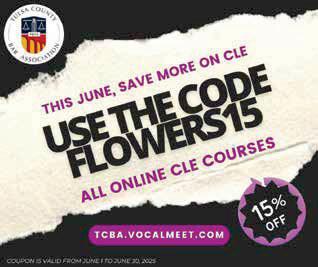
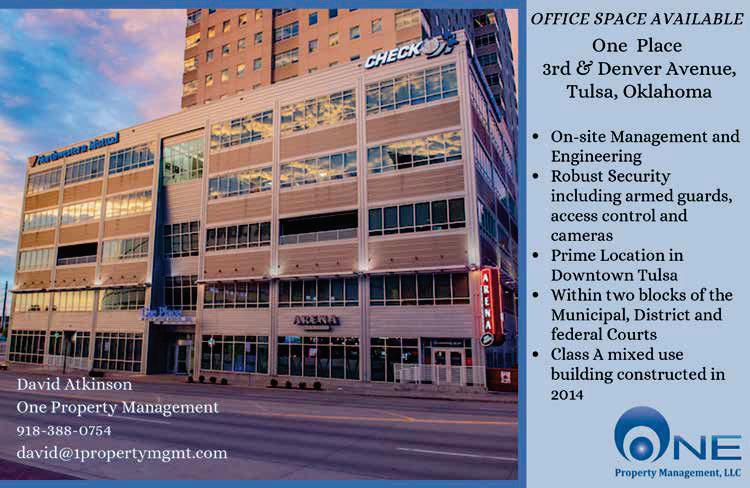
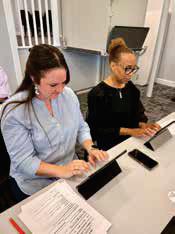
Ask-a-Lawyer 2025 ~ Thursday, May 1st



Community Outreach Iron Gate Volunteer Day ~ Saturday, March 29th




Member Event: Tours of Tulsa-Art Deco Style ~ Saturday, April 12th
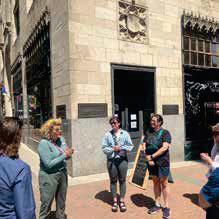

Brown Bag CLE: Tulsa County Alternative Courts, Litigation CLE with Judge Jason Robertson



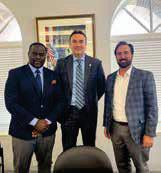



June marks the end of one season and the quiet beginning of another. As school years conclude, vacations are planned, and the summer heat rolls in, many of us take a step back— professionally and personally—to regroup. However, even in this quieter season, the Tulsa County Bar Association continues to move forward, and I would like to use this space to talk not only about what is next, but also why it matters.
July begins our membership renewal season. On the surface, this may appear to be a routine administrative item, one more deadline in a long list of things to manage. However, I encourage you to view it differently. Renewing your membership is an intentional act. It is a choice to remain engaged, to continue participating in something greater than your individual caseload. It is how we, as professionals, remain connected to our broader legal community, and how we, as a profession, maintain our relevance in a constantly evolving landscape.
way we work. Clients are adjusting how they interact with attorneys. Expectations on our time, focus, and expertise have never been higher. In the face of these changes, the TCBA is not simply a support system; it is a source of direction. From continuing legal education to practice-area roundtables, from wellness programming to mentorship opportunities, we are creating spaces where attorneys at professional development.
Remaining current is no longer optional. Remaining connected should be considered just as essential.
Earlier this spring, many of you participated in our Law Day events to help bring legal knowledge to the public, engaging with students, and representing our profession in meaningful ways. These moments are more than longstanding traditions. They are how we reinforce public trust, how we clarify the role of the legal system in daily life, and how we reconnect with the values that brought us to this profession.
So, what lies ahead?
As we prepare for a new membership cycle, I encourage each of us to consider our involvement not as a routine obligation, but as an ongoing commitment to relevance,
on a leadership position in a TCBA section. It might involve
attending an event that falls outside your usual schedule. Or it might be as simple as reaching out to a colleague and inviting them to become more involved.
This is not about doing more for the sake of busyness. It is about doing more of what truly matters, together.
voices, practices, and professional experiences within our legal community. Whether you are a litigator, a transactional attorney, an in-house counsel, or serve in the public sector, your perspective is valuable here. And there is meaningful work to be done that only you can contribute.
As we look ahead to July, I encourage you to renew not only your membership, but also your sense of purpose within the legal profession. Reconnect with the reasons you chose this path. Reinvest in the relationships that keep you grounded and inspired. And remember that the future of our legal community depends not only on the cases we handle or the
choose to be present.
Let us continue showing up.
Billy Duncan TCBA Vice President 2024-2025



12th Grade
Jorja Hermes

6th Grade
Addyson Meares

Kindergarten
Landon McNeely

9th Grade
Ajhith Balasubramanian

5th Grade
Ruth Letney

Pre K
Lena Wilson
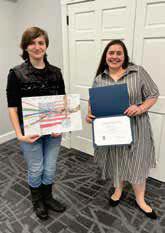
8th Grade
Sophia Durant
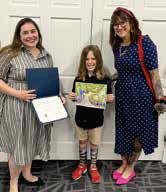
2nd Grade
Grayson Zell

Sibling Winners with the OBA and TCBA
Aadhya and Ananya Duggirala

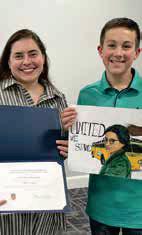
7th Grade
Kaigen Greenlee

1st Grade
Maerwynn Brostrom

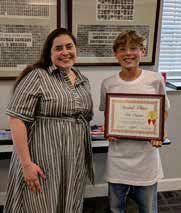
Tulsa County Bar Center Summer Hours
Monday - Thursday, 9am-5pm
Friday, 9am-Noon

Pray Walker is excited to announce the addition of partner, A. Grant Schwabe as part of its expanding commercial litigation practice.
“Grant brings a wealth of experience and a stellar reputation to our team,” said C. Bretton Crane, managing partner at Pray Walker. “His depth in commercial and general civil litigation and background strengthen our ability to deliver exceptional legal counsel to our clients.”
commercial litigation arena that includes successfully litigation, real estate transactions, construction disputes, oil and gas matters, and labor and employment law. In addition to his trial experience, Schwabe has represented clients in over sixty appeals, ranging from cases before the Oklahoma Court of Civil Appeals and Oklahoma Supreme Court, to the
as a “Rising Star” in Business Litigation by Super Lawyer Magazine on multiple occasions.
Helton Law Firm is proud to announce that Patrick H. “Pat” Kernan
Kernan has over 50 years of distinguished legal experience, with a focus on complex business litigation and trust and estate disputes. He has served as counsel to the Oklahoma Board of Bar Examiners for more than four decades and States District Court for the Northern District of Oklahoma since 2008.
Recognized with an AV® Preeminent™ rating from standards of professional excellence.
“We are thrilled to welcome Pat Kernan to Helton Law Firm,” said Scott Helton, Founder and Managing Partner of Helton Law Firm. “Pat’s extraordinary career and dedication to the legal profession set a benchmark of excellence. His extensive experience in business litigation
exceptional representation to our clients. We are honored to have him on our team.”
James H. “Jim” Beauchamp the practice of law on May 1, 2025. Helton Law Firm is honored to continue serving Mr. Beauchamp’s clients and is committed to providing the same trusted, compassionate, and skilled legal representation that Jim offered throughout his distinguished career.
“It’s an honor to carry forward the trusted relationships Jim built with his clients over the years,” said Scott Helton, Founder and Managing Partner at Helton Law Firm. “We are committed to maintaining the same level practice.”
Helton Law Firm regularly assists estate planning and probate attorneys planning for retirement by offering tailored solutions to ensure that their clients continue to receive the highest level of service. It is our privilege to help and peace of mind.

Midtown Location witheasy B.A. access to courts. Plush space with reception, copier, phone, internet



By being a member of the TCBA, you are also a member of the Tulsa County Bar Foundation. As a general rule, the funds that come into the Foundation are the result of a fundraising event for our community, and the monies raised are immediately distributed back out into the

In an effort to assist the Foundation, we have implemented a monthly “Fund the Foundation” program. To participate we are asking each member who has a birthday this month to consider making a donation to the Foundation. You can do so with the QR Code shown here.
If you are not currently a Fellow, please consider joining that program. As a thank you (and let’s be honest, an encouragement the 10th of the month we will include a shout out to you in the next issue of Tulsa Lawyer Magazine.

Tulsa Lawyer is a monthly publication of the TCBA. The TCBA does not necessarily share or endorse the opinions expressed in the materials published. The views are those of thoughtful contributors. Similarly, advertising does not imply endorsement by the TCBA of products or services or any statements concerning them.
PHONE: 918-584-5243 FAX: 918-592-0208
1446 South Boston, Tulsa, OK 74119-3612
Executive Director
Tami Williams tamiw@tulsabar.com Ext. 1002
Membership Director CLE, Sections & Committees
Heather Heck heatherh@tulsabar.com Ext. 1001
Front Desk Coordinator
General Inquiries frontdesk@tulsabar.com Ext. 1000 Accounting accounting@tulsabar.com
Lawyer Referral & Community Resource Navigator Jeril Haug jerilh@tulsabar.com Ext. 1003
Tulsa Lawyer Editors - Rhiannon Thoreson Madison Cataudella
Associate Editor - Milly Dunlap Tulsa Lawyer Submissions - tulsabarnews@yahoo.com
TCBA OFFICERS
President ..............................................................Stephanie Jackson
Past President.............................................................Mike Esmond
President-Elect.....................................................Michael Taubman
Vice President..............................................................Billy Duncan
Secretary....................................................................Shena Burgess
Treasurer..........................................................Mbilike Mwafulirwa
Budget/Internal Operations........................................John Gotwals
Foundation President ..................................................Justin Munn
ABA Delegate............................................................. Molly Aspan
OBA Delegate..............................................................Philip Hixon
Presiding Judge .......................................... Hon. Dawn Moody
Chief Judge, Tulsa Municipal Court..........Hon. Gerald Hofmeister
YOUNG LAWYERS DIVISION BOARD
YLD Chair............................................................Lacy Williamson
YLD Past-Chair.................................................Colton Richardson
YLD Chair Elect.............................................................Kyle Trice
YLD Vice President...................................................Isaiah Brydie
YLD Treasurer..........................................................Morgan Smith
YLD Secretary..........................................................Kaia Kennedy
FOUNDATION APPOINTMENTS
Law Day Chair ....................................................Tana Van Cleave
Community Outreach................................................ Ashley Webb
Community Outreach Co-Chair...................... Madison Cataudella
Golf Chair................................................................Michael Thelen
Scholarship Chair........................................................Randy Lewin
FOUNDATION
President.....................................................................Justin Munn
Treasurer...........................................................Catherine Hoopert
Trustee........................................................................Jim Gotwals
Trustee...........................................................................Ann Keele
Trustee..........................................................................Rick White
Trustee.........................................................................Lizzie Riter
Trustee ......................................................................Chad McLain
Trustee .......................................................................Kara Vincent
Trustee .....................................................................Mike Esmond
TCBA President................................................Stephanie Jackson
TCBA Pres. Elect..............................................Michael Taubman
COMMITTEE CHAIRPERSONS
Access to Justice... .......................................................Katie Dilks
Animal Law ................................................................Katy Inhofe
Animal Law Co-Chair..............................................Erica Grayson Bench & Bar........................................................Kevinn Matthews
Children & the Law.......................................................Lexie Allen
Children & the Law Co-Chair..............................Michael Nesser
CLE...............................................................................Open
Diversity Development...........................................Marvin Lizama
Diversity Development Vice-Chair ............................Matt Ingham
Fee Arbitration.............................................................Scott Savage
Law Related Education / Street Law.........................Pierre Robertson
Law Related Education/Street Law Co-Chair............ Kara Vincent
Lawyer Referral ..........................................................Alan Barker
Mentoring ................................................................Shena Burgess
Mentoring Co-Chair................................................... Natalie Frost
Military/Veterans ..................................................Mitchell Garrett
Nominations & Awards .............................................Mike Esmond
Pro Bono................................................................. Shandi Stoner
Pro Bono Co-Chair ........................................................Eric Yoder
Professionalism ............................................................Rick White
Membership & Special Events..................................Natalie Sears
Membership & Special Events Co-Chair .......................Kara Pratt
Publications......................................................Rhiannon Thoreson
Publications Co-Chair .....................................Madison Cataudella
SECTION CHAIRPERSONS
ADR/Mediation................................................... .......Zack Brown
Bankruptcy ........................................................Hon. Paul Thomas
Business/Corporate................................................Spencer Pittman
Criminal Law .........................................................................Open
Energy & Mineral Law.............................................Buford Pollett
Employment Law ......................................................Chris Vaught
Family Law ..........................................Anastasia Krich-Mahoney
Health Law................................................................Shelby Fields
Immigration ................................................................Elissa Stiles
Immigration Vice-Chair ..............................................Karri Payne
Juvenile Law. .........................................................Michael Nesser
Juvenile Law Co-Chair..................................................Lexie Allen
Litigation................................Mbilike Mwafulirwa & Mark Smith
Municipal Law..................................................Rhiannon Thoreson
Paralegals/Legal Assistant.......................................Danna Malone
Paralegal /Legal Assistants Vice Chair.....................Sabrina Nitz
Paralegals / Legal Assistant - Secretary.......................Sheri Ward
Probate/Estate/Elder Co-chair............................... Phillip Jennings
Solo/Small Firm .......................................................Mary Clement
Tax Co-Chairs..............................John Gotwals / Lauren Peterson
Technology ...............................................................Trevor Riddle
Workers Comp...........................................................Valerie Evans
Workers Comp Co-Chair ..........................................Micah Felton
